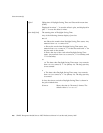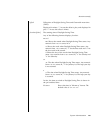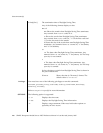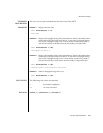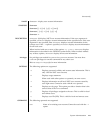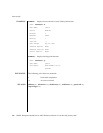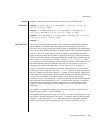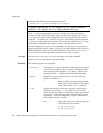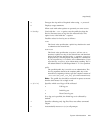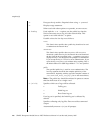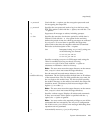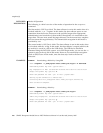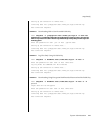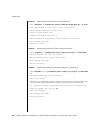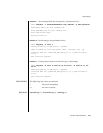
snapshot(8)
416 SPARC Enterprise Mx000 Servers XSCF Reference Manual • Last Revised January 2007
command. The following example decrypts the file
jupiter_10.1.1.1_2006-07-08T22-33-44.zip.e:
Every .zip archive generated by snapshot includes two files generated by
snapshot itself. The first file, called README, contains the original name of the
.zip archive, the name of the configuration file on the Service Processor used to
create the .zip archive, the version of snapshot and whether log-only mode (the
-l flag) was used to generate the archive. The second file, called CONFIG, is a copy
of the actual configuration file used by snapshot to generate the archive.
The data collected by snapshot may potentially be used by Service personnel to
diagnose problems with the system. snapshot can collect different sets of data for
different diagnostic purposes. The three different sets are named Initial, Root
Cause, and Full, and are specified through the use of the -L option.
Privileges You must have platadm or fieldeng privileges to run this command.
Refer to setprivileges(8) for more information.
OPTIONS The following options are supported.
% openssl aes-128-cbc -d -in jupiter_10.1.1.1_2006-07-08T22-33-
44.zip.e -out jupiter_10.1.1.1_2006-07-08T22-33-44.zip
-D directory Used with the -T option, specifies a value for directory instead
of the value set using setarchiving(8). The directory field
must not begin with a hyphen (-) or a tilde (~). Refer to the
description of the -T option for more detailed information.
-d device Specifies the external media device to use. The following
option is available to -d:
-r Removes all files from the external media
device prior to data collection. This option
is not valid with the -t or -T options.
-E time Specifies the end time for the time period for which data is
collected. Used with the -S time option for the start time,
defines the period of time for which log messages are collected
by snapshot. Only those log entries created before the time
specified by -E time are collected by snapshot. Refer also to
the description of the -S option.
time Interpreted using strptime(3), using one
of the following two formats:
%Y-%m-%d,%H:%M:%S
%Y-%m-%d_%H-%M-%S



